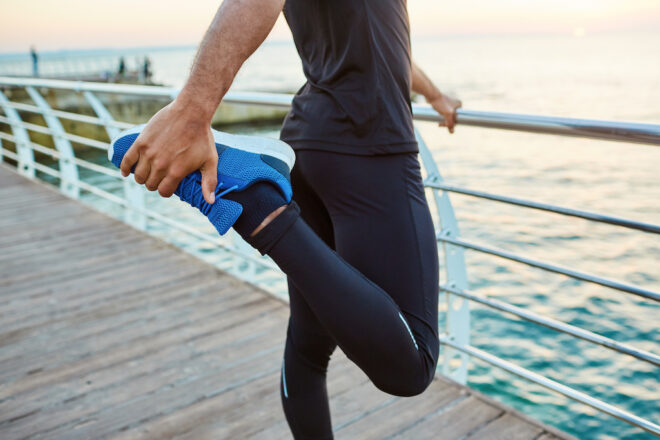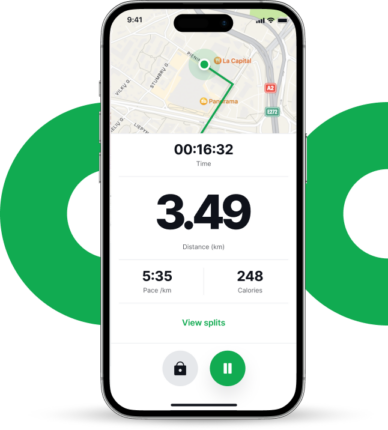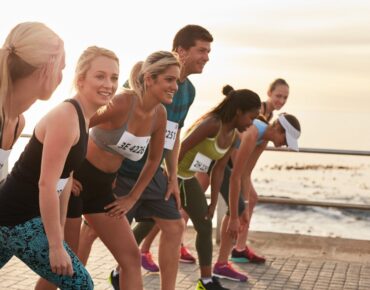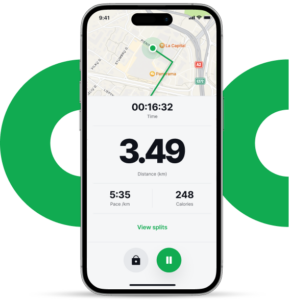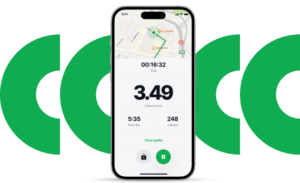When you finish your run, you should have worked up a nice sweat. Perhaps your muscles are aching. Your heart will be pumping faster, and you may even be panting or sucking wind.
Despite all this, you will be feeling good, thanks to all the endorphins pumped into your brain. You will feel ready to conquer the world.
But, before you do anything else, it’s important to take some time and cool down after running. So, how do you cool down after a run? And what are some great cool-down exercises you can try before you begin your quest for world domination?
In This Article:
Benefits of a Cool-Down After Running
Just as a warm-up routine is vital before any intense exercise, a cool-down program is just as essential. In order to get the benefits of a cool-down, you need to:
- Regularize your heart rate – It is always good when your heart pumps faster during exercise. That is how you know that your activity is working. At the same time, you must allow it to get back to normal slowly. Otherwise, you can get dizzy and even faint. This can happen because blood pools downward if you don’t follow a cooling routine. The blood flow must subside slowly because a sudden drop can cause unwanted problems.
- Normalize breathing – If you breathe very deeply when running, you must get back to normal breathing afterward. With a cool-down routine, your breathing will also get its normal rhythm back. Not getting back to normal breathing may lead to lightheadedness and dizziness.
- Prevent injury – Your muscles have been overworked while you run. You can squander all your running gains if you don’t take care. If you don’t follow a cool-down routine, your muscles are prone to strain and tears. It can be painful and prevent you from continuing your regular running cycle.
- Improve focus and relaxation – A follow-up routine after intense physical activity helps your mind relax. When you know that you’ve accomplished what you had set out to do, it reinforces your confidence, and you are mentally more focused on what you want to do with the rest of your day (or even sleep better at night if you are an evening runner).
A warm-up routine, a run, followed by a cool-down routine, enables you to reap the many benefits of exercise and improves your physical fitness. You also reduce your risk of injuries.
How to Cool Down Effectively After a Run
While any kind of cool-down is better than none, some have more benefits.
Just 5–10 minutes of walking or easy jogging after a run can go a long way in regularizing your heart and breathing rate.
If you follow this with some easy-to-do stretches, you will help prevent muscle soreness and injuries. But be careful – how you stretch is important. Be sure to take your time and do the exercises properly. How long you stretch and how well matters!
Here are a few stretches to start with:
- Thigh stretch – Standing straight, lift your foot backward toward your lower back and hold with your hand. Hold while you feel the stretch, then let go. Do the same with both feet for 5–10 repetitions.
- Hip stretch – Put your right foot forward and bend the right knee till you feel the stretch in your hips. Go back to your original position and then do the same with the left side. Repeat 5–10 times.
- Toe touch – Keep your legs apart and your arms out. Touch your right hand to your left foot, and then go back to your original position. Do the same with the other side. Again, repeat 5–10 times.
You can do other stretches, too – just make sure that you feel the stretch when you do them. Some other stretches to possibly incorporate into your cool-down are:
- Hip flexor stretch
- Quad stretch
- Glute bridge
- Calf stretches
- Pigeon pose
- Downward dog
And remember, the longer or more intense the run is, the more time you should spend stretching.
Cooling Down: From Jogging to Walking to Much, Much More
When you take part in a race, you are likely to be in a competitive frame of mind and will be running faster and longer to do your best.
You should do some slower walking for 10 minutes to regularize your heart rate and breathing after this.
Follow up with a cold water bath or shower for 10 minutes. It will help relax the muscles and the mind, and you will feel fresh and energized. The cold water will help reduce any swelling.
Then it is time for some yoga poses: lunges like warrior 1 and 2 are effective stretches. The supported fish pose, the pigeon pose, and the legs up on the wall are all beneficial. Just 5–10 minutes is all you need.
At least two or more hours after the race, you can do other stretches and use foam rolling to get better flexibility and improve muscle recovery.
How about a massage? If you’re considering getting a massage, wait for some hours or even a day. Immediately after a run, your muscles will actually be more prone to damage with a massage. Deep tissue massage, active release (A.R.T.), trigger point, or Swedish massage by a massage therapist can be therapeutic and aid in recovery.
Running is an excellent exercise and helps keep your body active and fit. Cool-down routines help prevent injuries and speed up recovery, so make sure you adopt these healthy, cooling habits.
Key Takeaways
- When you have sweated it out after a run, your instinct will be to go for a shower or sit on the couch – both are a bad idea. You must do some cool-down exercises right away.
- Slow walking, stretches, cold water, and massage are suitable for cooling down – these will help normalize your heart rate, breathing, blood pressure and aid in muscle recovery.
- Spending just 10 minutes on cool-down routines is helpful for your everyday run. If you are running a hard race, you may need to spend more time to avoid sore muscles or injuries.

